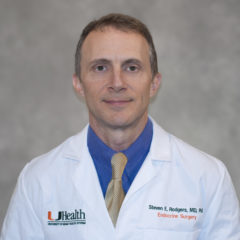This website provides information for patients undergoing endocrine surgery in Miami . Endocrine surgery involves the surgical treatment of diseases of endocrine organs — organs that secrete hormones. Endocrine organs include the thyroid gland, parathyroid glands, pancreas, and adrenal glands. This website provides information for patients undergoing endocrine surgery in Miami and the surrounding areas of South Florida. It is hoped that this information will serve to supplement the one-on-one conversations that you have with your surgeon. More information about Dr. Rodgers can be found at About Dr. Rodgers and at UMiamiHealth.org.
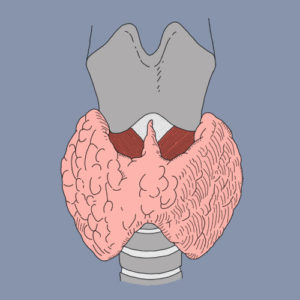 Thyroid Surgery
Thyroid Surgery
The thyroid gland is located in the lower neck on either side of and in front of the trachea (windpipe). It functions as a master controller of the body’s metabolism. Common diseases of the thyroid gland include hypothyroidism (not producing enough thyroid hormone), hyperthyroidism (producing too much thyroid hormone), benign thyroid nodules, and thyroid cancer. Hypothyroidism is generally not a condition treated by surgery. However, the other conditions listed above may be treated with medications or surgical removal of the thyroid gland. Thyroid surgery typically involves removal of one half of the gland (i.e., hemithyroidectomy) or all of the gland (i.e., total thyroidectomy). For a more detailed discussion of thyroid anatomy and physiology and information about thyroid surgery, see the page entitled Thyroid Surgery in Miami.
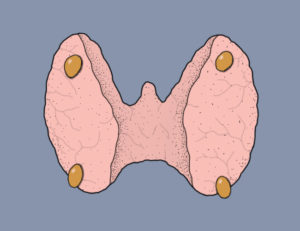 Parathyroid Surgery
Parathyroid Surgery
The parathyroid glands are four small glands in the neck near your thyroid gland. The prefix “para” means near or adjacent to. These glands produce a hormone that controls calcium levels in the bloodstream. The most common disease of the parathyroid glands is primary hyperparathyroidism, in which one or more of the glands produce too much parathyroid hormone, often resulting in elevated calcium levels (i.e., hypercalcemia), osteoporosis, and kidney stones. Patients suffering from primary hyperparathyroidism often undergo surgery to remove one or more of the parathyroid glands. This is known as parathyroidectomy. For a more detailed discussion of parathyroid surgery, see the page entitled Parathyroid Surgery in Miami.
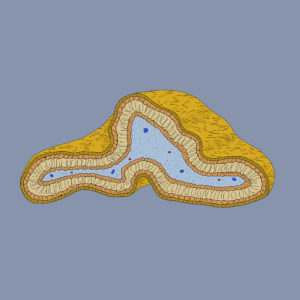 Adrenal Surgery
Adrenal Surgery
The adrenal glands are 2 paired organs that lie in the retroperitoneum, just above the kidneys. The adrenal glands produce a number of hormones that control blood pressure, metabolism, and sexual characteristics. Benign tumors of the adrenal gland are found quite frequently, and the incidence of adrenal nodules increases with age. The majority of these nodules do not produce hormones and, therefore, pose no health risk. On occasion, a nodule will produce a single hormone in excess. This can lead to significant physiologic derangements. We most often perform adrenalectomy to remove one of these functional nodules (i.e., nodules that are producing a hormone). For a more detailed discussion of adrenal surgery, see the page entitled Adrenal Surgery in Miami.
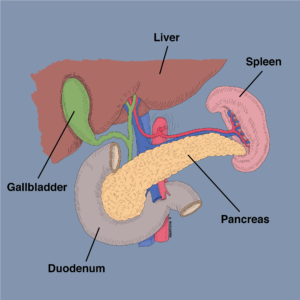 Pancreas Surgery
Pancreas Surgery
The pancreas is a soft organ in the upper abdomen. It produces enzymes that aid in the digestion of fats and protein in the small intestine. Additionally, the pancreas secretes a number of hormones into the bloodstream, including insulin. Most operations performed on the pancreas involve removing part (or occasionally all) of the pancreas in order to remove tumors that are malignant or could be malignant. For a more detailed discussion of pancreas surgery, see the page entitled Pancreas Surgery in Miami.
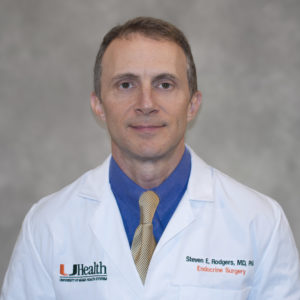 Endocrine Surgery in Miami
Endocrine Surgery in Miami
Endocrine surgery may be performed by a general surgeon or an otolaryngologist (ear, nose, and throat doctor, or ENT). General surgeons who practice endocrine surgery often have specialty training in either endocrine surgery or surgical oncology. Specialty training in these areas requires a one- or two-year fellowship after completing a general surgery residency. Surgeons who specialize in endocrine surgery in the Miami area can be found at larger medical centers and universities, such as the University of Miami Miller School of Medicine.
Steven E. Rodgers, MD, PhD
Dr. Rodgers is an endocrine surgeon at the University of Miami Miller School of Medicine near downtown Miami. He is a general surgeon who completed a 2-year fellowship in surgical oncology at the University of Texas M.D. Anderson Cancer Center. Dr. Rodgers has been in practice since 2006, when he completed his training. His practice consists of endocrine surgery and GI surgical oncology. He routinely performs thyroidectomy, parathyroidectomy, adrenalectomy, and pancreatectomy, as well as a variety of other procedures that involve removal of tumors. More information about Dr. Rodgers can be found at About Dr. Rodgers and at UMiamiHealth.org.
